(Note: This post may be too long to fully appear in email clients. Click through for the full text on the web.)
I recently finished reading Sally Rooney’s Intermezzo, and as expected, I liked it!
After posting to Twitter about my enjoyment of the novel,
challenged me to write a newsletter about love stories. As the Sally Rooney discourse has already moved on, and as the post above indicates, I don’t have all that much interest in the discourse to begin with, Austin’s suggestion sounded like a good idea.Intermezzo is a love story, or love stories more accurately. The main protagonists are brothers Peter and Ivan Koubek, Peter a stylish barrister in his early 30’s, and Ivan, a decade younger chess prodigy with braces and an unfortunately declining rating at the game he’s been obsessed with for years. Their father has recently passed away after an extended illness (cancer) and they are grieving. The brothers have a difficult time connecting with each other because of their differences, both real and perceived, the age gap, their underlying world views, the ways they related to the deceased father and still living mother.
Peter is caught between two women, Sylvia, the love of his life who was injured in an accident, leaving her in near constant pain and incapable of physical intimacy, turning her into Peter’s platonic best friend, and Naomi, a student and part time sex worker ten years his junior with whom he is obsessed physically, but also increasingly emotionally entangled.
Ivan meets Margaret at an exhibition where he plays ten members of a local chess club simultaneously, beating them all handily. She’s in her mid-30’s, divorced, living in the same town she grew up in, running the cultural center where the event was held. She is immediately taken by Ivan, and he by her, and a relationship forged in mutual desire quickly ignites.
No spoilers from me, but throughout the novel, Peter is tortured by his twin loves, while Ivan is, increasingly, empowered. Margaret too is reborn through her relationship with Ivan, even as she is plagued by doubts their age difference, the complications of her previous marriage to a hopeless alcoholic, and the fear of judgment by her community.
Sally Rooney is clearly interested in the intersection of sexual desire and love (see also: Normal People), and in Intermezzo there is a lot of exploration of the ways sexual intimacy shapes the emotional resonances of love. The bedroom action is often pretty hot stuff!
But it’s not only hot stuff. It’s part of what love means to these characters in this book, and I appreciated where Sally Rooney took me on this particular journey. She’s written an excellent love story(ies).
So, I want to take up Austin’s challenge, but I don’t want to do it in a way where I’m suggesting that this is some kind of definite list of love story novels. These are the love stories that come to my mind while I sit here, typing in the Substack interface. I find that letting what ever comes to mind guide my explorations often results in more meaningful connections than trying to force categorizations or conclusions.
Now, let’s see where we go.
Young love
I think one of the reasons the generation of young adult novelists that arose well after I was a young adult became so huge, significantly crossing over to adult readership, was their willingness to treat the romantic love of teenagers seriously as a subject worthy of exploration and dramatization. John Green and his novel The Fault in Our Stars is probably the best example of this principle that I can think of, though I’d be interested in others if people can think of them.
It is easy with the benefit of age and hindsight to look askance at the love of young people and dismiss it as something lesser than the experience of mature relationships, but I challenge anyone to go back to the first feelings of romantic love they felt for another as a teenager, and then those feelings being reciprocated - should they be so fortunate - and tell me that shit’s not serious. No, I didn’t “love” my high school girlfriend the way I love my wife because I was 18-years-old, but feeling that way about someone else when you’re young helped turn me into a relatively well-adjusted person.
The desire to love and be loved it real.
The Fault in Our Stars is predicated on an inevitable tragedy - Hazel and Augustus meet in a juvenile cancer support group - but it is not the tragedy that defines their relationship. Green renders them as people with deep desires, not types or avatars of doomed romance like Romeo & Juliet.
The book is clearly a step up in terms of depth from the important teen love texts of my youth - the films of John Hughes - which explored these issues, but seemed to inevitably flinch in their concluding moments, particularly when it came to the agency of Molly Ringwald’s characters.
(Do I have to say spoiler alert for movies that are almost 40 years old?)
Consider the conclusion of Sixteen Candles, which puts Ringwald’s Sam in the car with Jake, the hot guy who has not had an interesting thought for the entire movie. WTF? As the kids don’t say anymore.
Or The Breakfast Club, where Ringwald’s Claire is seemingly now attached to Bender (Judd Nelson), who has spent the entire film negging her.
The worst is Pretty in Pink, where poor, quirky Duckie (Jon Cryer) must stand aside for Blaine (Andrew McCarthy), when it comes to the affections as of Molly Ringwald’s Andie, once Blaine shows that he’s not like all the other rich assholes. Hughes ultimately defaults to relationships as a kind of question for status. The fact that Molly Ringwald was only unconventionally beautiful was portrayed as a kind of victory.
Anyway.
(See also: Eleanor & Park by Rainbow Rowell.)
Tragic love
The most emotionally moving love story I’ve ever read is Giovanni’s Room by James Baldwin.
The novel is the story of American expatriate David in Paris, where he is questioning his engagement to his girlfriend and falls into a passionate affair with Giovanni, an Italian bartender. We know from the beginning that tragedy has already occurred through David’s narration when he informs the reader that Giovanni is to be executed the next day.
Giovanni will die, but the ongoing tragedy is David’s as he cannot manage the internalized shame he feels over his sexuality, which runs in direct contrast to the freedom with which Giovanni lives his life.
By foregrounding Giovanni’s death and requiring the reader to experience through David’s perceptions, Baldwin forces us into emotionally wrenching spaces.
I don’t have anything particularly original to say about the novel, but I highly recommend this essay by
on the importance and limitations of Giovanni’s Room as a masterpiece of gay literature.Mysterious love
Love built on a mix of passion, competition, and mysteries between partners is the milieu of this book. You might think I’m talking about Gone Girl, but no, this is Fates & Furies by Lauren Groff.
Everyone knows that the charismatic and beautiful Lotto and Mathilde are meant to be together when they meet as students, and ten years into marriage they seem to still be a couple of destiny. Like Gone Girl, when you hear the story from one side of the relationship you think you know what’s up, but this is flipped on its head when the perspective shifts and some of these mysteries are revealed to the reader.
This is a type of love I don’t really understand and certainly don’t desire, but it’s a heck of a ride.
See also: The Virgins by Pamela Erens.
“Ordinary” love
Saul and Patsy meet in college, and as opposites (Saul: neurotic Jew; Patsy: pragmatic gentile) are instantly attracted to each other, graduate, move to a nondescript town in Michigan where Saul finds work as a teacher, and begin their “grown-up” lives of two people in love.
Charles Baxter is one of our best novelists at depicting the specifics of domestic life in ways that establish the intimacy between the characters to each other, and the reader to the characters. When this simple domesticity is disturbed by a troubled student of Saul’s, Saul and Patsy takes on a potential darkness that threatens to explode this ordinary happiness.
FYI: I’ve got a review of Baxter’s new book Blood Test coming in my column next week and a Q&A with him that I’ll be sharing here.
See also: Morningside Heights by Joshua Henkin. Mrs. Bridge by Evan S. Connell.
Mature love
Addie and Louis are alone, widowed years before, kids gone away. Addie doesn’t want to be alone anymore so she goes to Louis’s house and suggest they start spending their nights - the worst time to be alone - together.
The town busybodies don’t approve, and the children are confused, but Addie and Louis are increasingly fulfilled by their late in life relationship, which is surely an example of love.
Our Souls at Night was published posthumously and is set in the same small town (Holt, Colorado) as Haruf’s other novels. Haruf’s books are notable for the way he dramatizes the impulse to be kind to others. It’s strange that this should be the stuff of drama, but it works well in all of his books, especially this one.
I’ve got lots of other love story books in my head, but that’s enough of me. What are the love stories that you most recall?
Links
This week at the Chicago Tribune I pay tribute to Robert Coover following his recent passing at the age of 92. If you don’t know Coover’s work, I recommend you take some time to familiarize yourself with one of the singularly inventive writers of the last fifty years.
At Inside Higher Ed, I covered two new books offering cautionary tales about integrating AI into education systems, AI Snake Oil: What Artificial Intelligence Can Do, What It Can’t, and How to Tell the Difference, and Smart University: Student Surveillance in the Digital Age.
I was a real digital blabbermouth this week as I also explored some thoughts on what it means for students to be “college ready” at my other newsletter.
The Kirkus Prizes in fiction, nonfiction, and young readers literature were announced this past week.
I would call what
describes in her newsletter post here “moral agency” rather than “moral vision” but that quibble aside, it’s interesting to consider how many novels seem to feature stuff just happening to characters without them exerting their agency in response. She uses Emma Cline’s The Guest as an interesting example.Speaking of love, as I have been, here is a very compelling essay by Bill Hayes who was the partner of neurologist and best selling writer Oliver Sacks in the final years of Sacks’ life, reflecting on the man he knew versus the public perception.
This week’s literary-themed humor from
and Sam Woods has absolutely nothing with our impending presidential election, I’m sure: “I’m an Undecided Hobbit, Torn Between a Dark Lord Who Promises and Age of Chaos, and an Elf Queen, Whom I Wish I Just Knew More About.”Recommendations
1. The Book of All Loves by Agustín Fernández Mallo
2. Practice by Rosalind Brown
3. Animalia by Jean-Baptiste Del Amo
4. The Empusium: A Health Resort Horror Story by Olga Tokarczuk
5. Overstaying by Ariane Koch
Mark N. - Poulsbo, WA
I have not read the top book on this list, but by its description, it looks like it would qualify as a love story worth reading. Anyway, Mark needs a book that’s going to make you think, but also deliver all the other pleasures of narrative. I’m going with The Guest Lecture by Marin Riker.1
The supply of requests is on the low side again, so if you’re looking for quick service, act now!
This is one of those weeks where I’m counting on the group to introduce me to some books I may not know. Let’s fill up those comments.
Thanks to
for the inspiration. Everyone should check out his newsletter which is chock with thought-provoking material about interacting with the world in meaningful ways.See you all next week,
John
The Biblioracle
All books (with the occasional exception) linked throughout the newsletter go to The Biblioracle Recommends bookstore at Bookshop.org. Affiliate proceeds, plus a personal matching donation of my own, go to Chicago’s Open Books and an additional reading/writing/literacy nonprofit to be determined. Affiliate income for this year is $104.50.




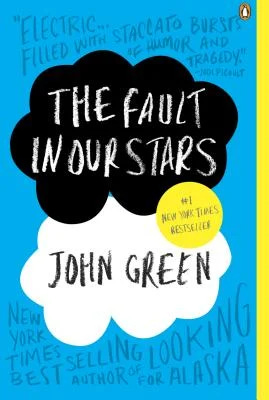
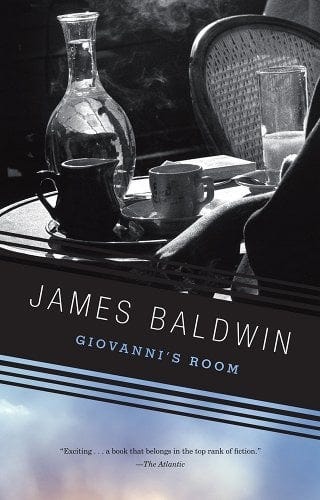
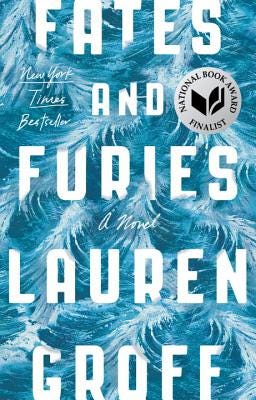
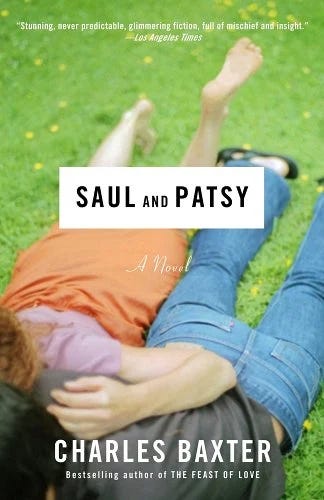
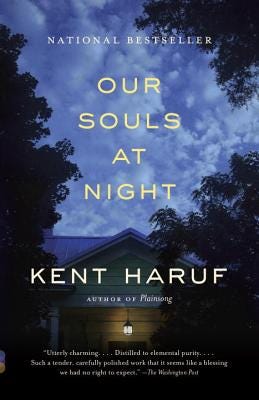

Oh my gosh. I've read almost every one of the books you list here, but am speared by your final named book, Haruf's. How I've adored him. How I've loved his stories across time.
I'm going to throw Chain Gang All-stars by Nana Kwame Adjei-Brenyah into the mix. This book has a lit to say but at its center is a love story.